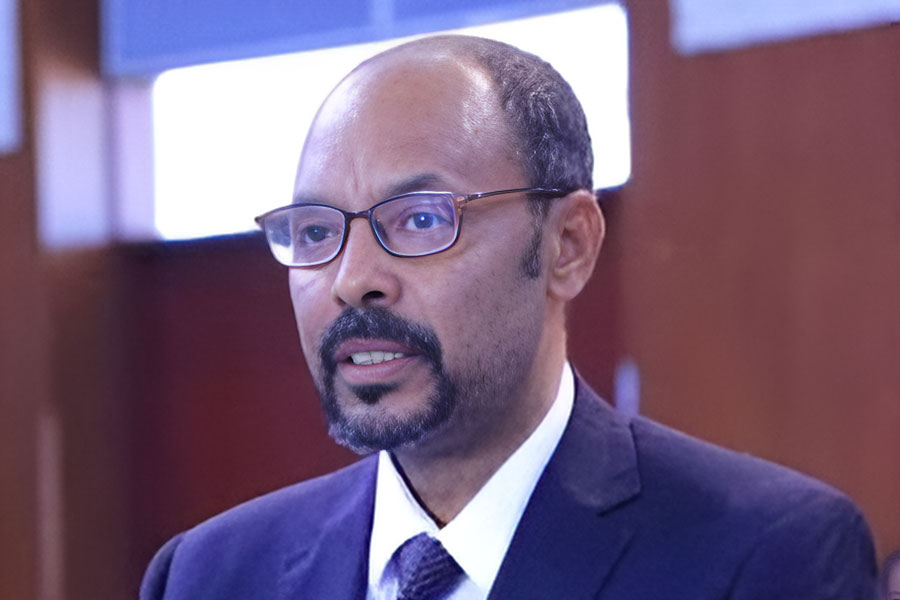
Radar | Sep 06,2020
Dec 2 , 2023
By Mariana Mazzucato , Partha Dasgupta and Nicholas Stern
Mounting scientific evidence that humanity has destabilised the global water cycle on which life depends is an indication that collective efforts have fallen short, even after three decades of UN climate negotiations. If the world does not urgently address this issue alongside other interlinked challenges, progress will be for nought, warn Mariana Mazzucato, founding director of the UCL Institute for Innovation & Public Purpose; Partha Dasgupta, chair of the Dasgupta Review on the economics of biodiversity; and Nicholas Stern, chair of the Grantham Research Institute on Climate Change and the Environment at the London School of Economics and Political Science. This commentary is provided by Project Syndicate (PS).
Nearly 30 years into global negotiations to address climate change, efforts to control the problem are lagging, reflecting stalled progress toward creating a sustainable trajectory more broadly. Each year of delay adds to the urgency of the situation and the need to maintain Earth's resilience against the most severe effects of global warming.
It has been 17 years since the "Stern Review" alerted the world to the costs of inaction on climate change, and two years since the "Dasgupta Review" did the same for biodiversity and the ecological underpinnings of our economies. Now, a similar expert consensus is emerging around water security. But, most countries still do not seem to understand that neglecting water could undo the progress made on other fronts.
We are facing a global water crisis that warrants the same level of attention, ambition, and action as the climate and biodiversity crises.
The links between the climate, biodiversity, and water crises point to a fundamental issue: our economies are based on flawed economics. Current economic thinking leads us to consider only the proceeds of pillaging of the planet, while ignoring externalities such as environmental damage and the liabilities they imply. This bad accounting makes us look wealthier when we are becoming poorer, depleting the sources of our well-being at the cost of future generations.
Worse, the same thinking results in inadequate policies. We are forever reacting to market failures and struggling to fill financing gaps, when we should be pursuing proactive strategies to shape the economy for the common good.
The myopic view of the world reflected in current economic thinking – and in our overexploitation of natural resources on a global scale – now risks destabilising the entire planet. We have already perturbed six of the "nine processes critical for maintaining the stability and resilience of the Earth system as a whole." The boundaries we are breaching – which include climate change, biodiversity loss, and freshwater change – define a safe operating space for humanity. By ignoring them, we have increased the risk of large-scale, abrupt or irreversible environmental changes that would gravely threaten human civilisation.
The Dasgupta Review called for a fundamental shift in economic thinking based on strong sustainability principles, envisioning an economy that operates – at all scales – within scientifically defined boundaries. We have a finite budget for environmental systems like water, biodiversity, carbon, nitrogen, phosphorus, pollutants, and soils. We need an economy that operates within these budgets in an efficient and socially responsible manner.
Without urgent, systemic, and collective attention on the inextricable links between climate change, water crises, and biodiversity loss, there can be no sustainable future, because inaction in one area invariably ripples across the others. Wetlands and forests are the world's largest carbon stores, and they depend on a stable water cycle and thriving biodiversity. Terrestrial carbon sinks absorb about 25pc of our carbon dioxide emissions. Without them, atmospheric CO2 would be 500 parts per million (ppm) instead of the current 420 ppm.
Urgently phasing out fossil fuels is necessary but not sufficient. Even if we could decarbonise the economy tomorrow, we still would not have a sustainable future until we take steps to maintain water systems and natural habitats. The science now shows that natural loss on its own can send us crashing through the Paris climate agreement's target of limiting global warming to 1.5°C above pre-industrial levels, ushering in a world where millions of people in vulnerable environments would no longer be able to adapt.
Safeguarding water resources and biodiversity must be prioritised alongside decarbonisation as we make the transition to an economy that operates within safe planetary boundaries. Following in the footsteps of the Stern Review on the Economics of Climate Change and the Dasgupta Review on the Economics of Biodiversity, the Global Commission on the Economics of Water is urging a similar shift on the issue of water.
This new thinking is based on three pillars.
We must treat the global water cycle as a common good governed collectively and in the interests of all. Not only is water increasingly intertwined with climate change and the depletion of the planet's natural capital; but it is also a major, but underappreciated, source of interdependence between countries.
We must also move beyond a reactive market-fixing approach, and toward a proactive market-shaping one that catalyses investment in water and prices negative externalities appropriately. Only with a new economic mindset can governments value, govern, and finance water in a way that drives the transformation we need.
Finally, addressing our interlinked challenges requires holistic, cross-sectoral, and outcomes-oriented "policy mixes," rather than the isolated and siloed interventions that have characterised economic policymaking until now. Mission-oriented economic strategies can mobilise all relevant ministries, sectors, and stakeholders around specific water-related goals, and outcomes-oriented instruments and institutions can help us achieve them.
The United Nations Climate Change Conference (COP28) in Dubai offers an opportunity for a significant breakthrough. Mounting scientific evidence that we have destabilised the global water cycle on which we all depend is a stark indication that our collective efforts have fallen short, even after three decades of UN climate negotiations, and a decade after the founding of the Intergovernmental Platform on Biodiversity and Ecosystem Services.
Water-related issues can no longer be ignored. If we do not urgently address them alongside our other interlinked challenges, our progress in other areas will be for nought.
PUBLISHED ON
Dec 02,2023 [ VOL
24 , NO
1231]

Radar | Sep 06,2020

Viewpoints | Oct 20,2024

Fortune News | Apr 12,2020

Sunday with Eden | Aug 16,2020

Fortune News | Dec 15,2024

Fortune News | Oct 20,2024

Fortune News | Apr 03,2021

Editorial | Mar 16,2024

Editorial | Jun 20,2020

Verbatim | Apr 08,2023

My Opinion | 131772 Views | Aug 14,2021

My Opinion | 128156 Views | Aug 21,2021

My Opinion | 126101 Views | Sep 10,2021

My Opinion | 123723 Views | Aug 07,2021

Dec 22 , 2024 . By TIZITA SHEWAFERAW
Charged with transforming colossal state-owned enterprises into modern and competitiv...

Aug 18 , 2024 . By AKSAH ITALO
Although predictable Yonas Zerihun's job in the ride-hailing service is not immune to...

Jul 28 , 2024 . By TIZITA SHEWAFERAW
Unhabitual, perhaps too many, Samuel Gebreyohannes, 38, used to occasionally enjoy a couple of beers at breakfast. However, he recently swit...

Jul 13 , 2024 . By AKSAH ITALO
Investors who rely on tractors, trucks, and field vehicles for commuting, transporting commodities, and f...

Jul 5 , 2025
Six years ago, Ethiopia was the darling of international liberal commentators. A year...

Jun 28 , 2025
Meseret Damtie, the assertive auditor general, has never been shy about naming names...

Jun 21 , 2025
A well-worn adage says, “Budget is not destiny, but it is direction.” Examining t...

Jun 14 , 2025
Yet again, the Horn of Africa is bracing for trouble. A region already frayed by wars...

Jul 6 , 2025 . By BEZAWIT HULUAGER
The federal legislature gave Prime Minister Abiy Ahmed (PhD) what he wanted: a 1.9 tr...

Jul 6 , 2025 . By YITBAREK GETACHEW
In a city rising skyward at breakneck speed, a reckoning has arrived. Authorities in...

Jul 6 , 2025 . By NAHOM AYELE
A landmark directive from the Ministry of Finance signals a paradigm shift in the cou...

Jul 6 , 2025 . By NAHOM AYELE
Awash Bank has announced plans to establish a dedicated investment banking subsidiary...